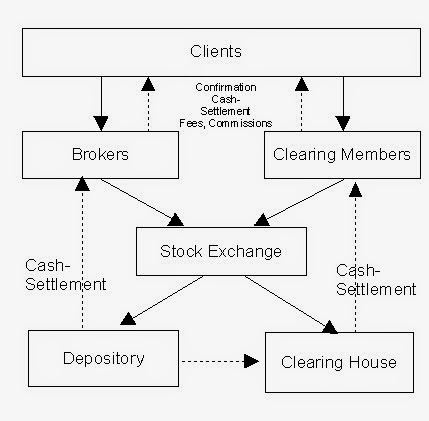Why does it take 2 days for settlement of trades?
You have traded on the stock market, but ever wondered how exactly is a trade settled?

You have traded on the stock market, but ever wondered how exactly is a trade settled? You bought some securities but how they get into your DEMAT? How is the amount for all trades settled to your trading account and bank?
There is a backend process with stock exchange known as the clearing process by which all the financial trades are settled on a timely basis, i.e. the transfer of funds to the seller and securities to the buyer. A specialized organization is responsible for clearing and settling all the trades, which is known as the clearing corporation.
Clearing validates the availability of proper funds and securities and ensures the delivery of the security and fund to the buyer and seller respectively. If trades are not cleared timely it can result in settlement risk which can further lead to loss of capital and real money.
All the trades placed through NSE are cleared through NSCCL which is National Securities Clearing Corporation Limited. It is the clearing and settlement agency for all trades placed and executed on National Stock Exchange.
A time of T+2 days is required for the settlement of trades executed on the NSE. All trades are usually settled in 2 working days after the trade is executed (T day). This time period does not include the exchange holidays. The clearing and settlement process are carried out in various phases
Trade Recording
All the information related to an executed trade are recorded by automated systems at the exchange. This information forms the base of settlement process. This is done on T+1 day.
For the settlement the trade details are first forwarded to the clearing house which is NSCCL in case of NSE. The clearing house then notifies the details of the trade to the clearing members and custodians as applicable. Instructions are forwarded to the clearing banks to arrange funds for the trade settlement by pay in time. A similar instruction is sent to the depository to arrange for the securities.
Pay-in of Funds and Securities
A pay in phase is started after that where depository and clearing bank both must pay-in the securities and fund respectively for clearing and settlement. In case if the depository is not able to pay in the securities due to short selling, the process takes T+3 days and an auction window is opened for buying of the securities during the market hours on the T+2 day itself and the settlement is thus completed on the T+3 day.
Pay-out of funds and securities
After the pay-in phase is completed and the securities and funds required for settlement are successfully “pay-in” a pay-out phase is started where the securities and funds are paid out to the respective depository and clearing bank.
The depository and clearing banks then inform the custodians or clearing members as applicable. The complete pay-out process is executed on T+2 day.

Dematerialized Settlements
The dematerialization of securities has significantly reduced the settlement time by using electronic modes for transfers wherever applicable with minimum human intervention to make the process precise and fast.
Materialized securities are not settled through the above process and are usually settled through over the counter processes which are time consuming.
The stock market is very volatile and trading and investing in the stock market your investments are at risk. The clearing and settlement also have various risks associated; therefore, a settlement guarantee fund is involved with every settlement which comes handy in case a trading member fails to meet his obligation. The members themselves contribute to the fund. This results in elimination of counter party risk of trading on the stock exchange.







